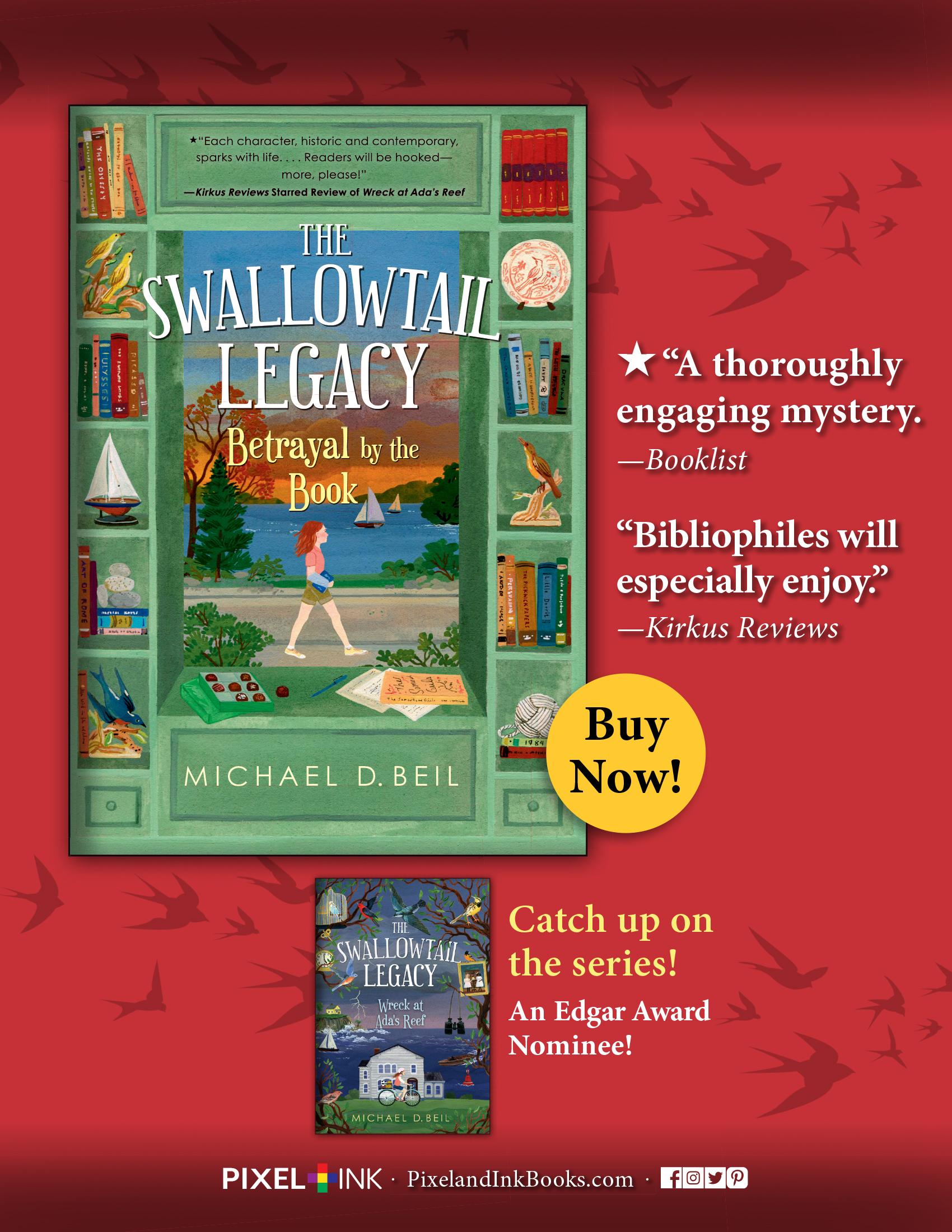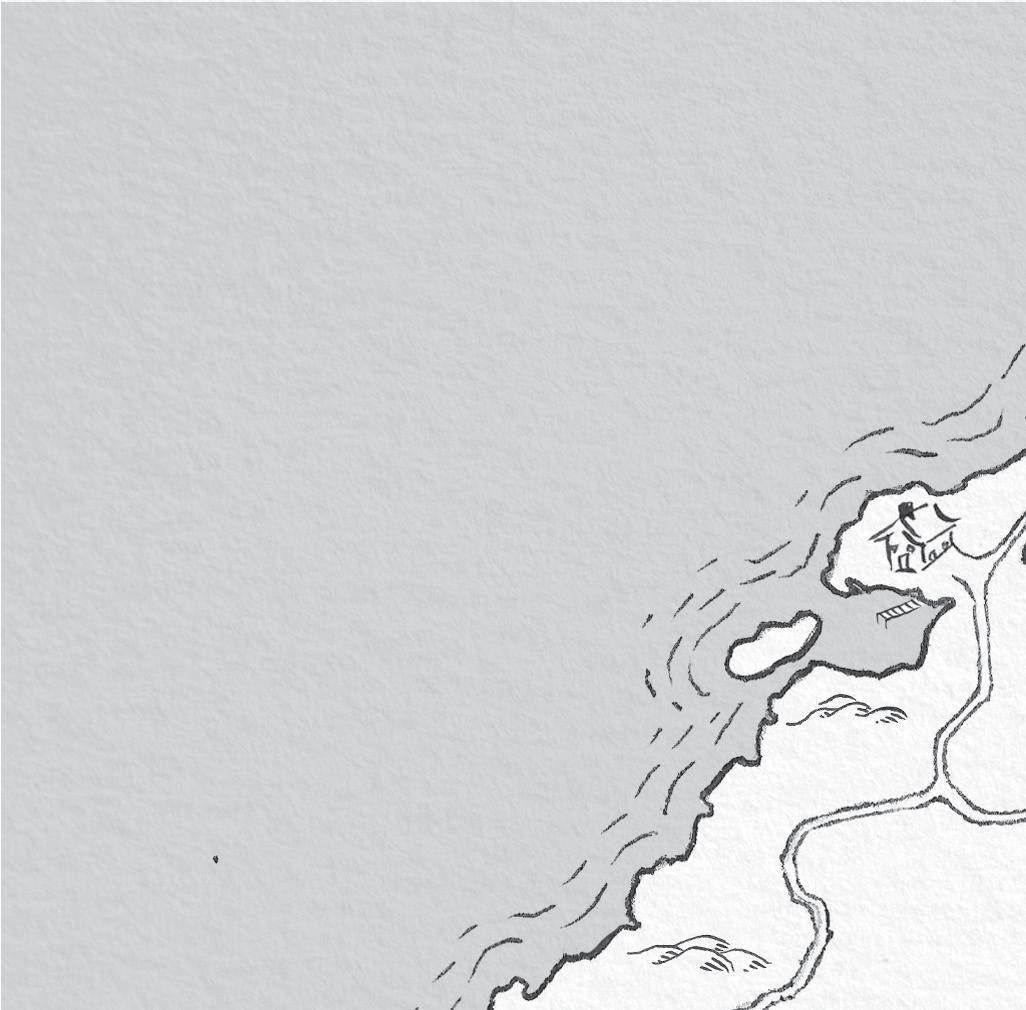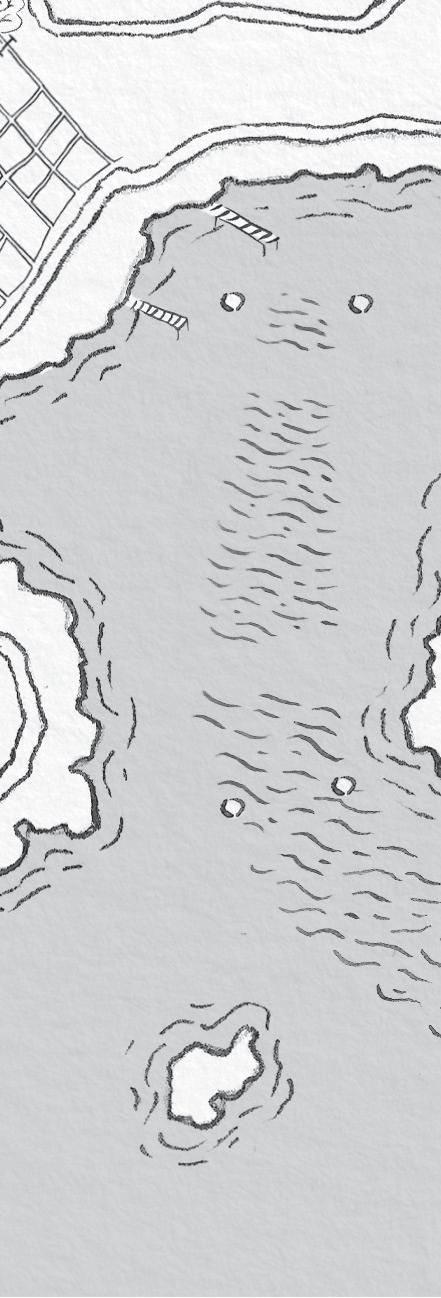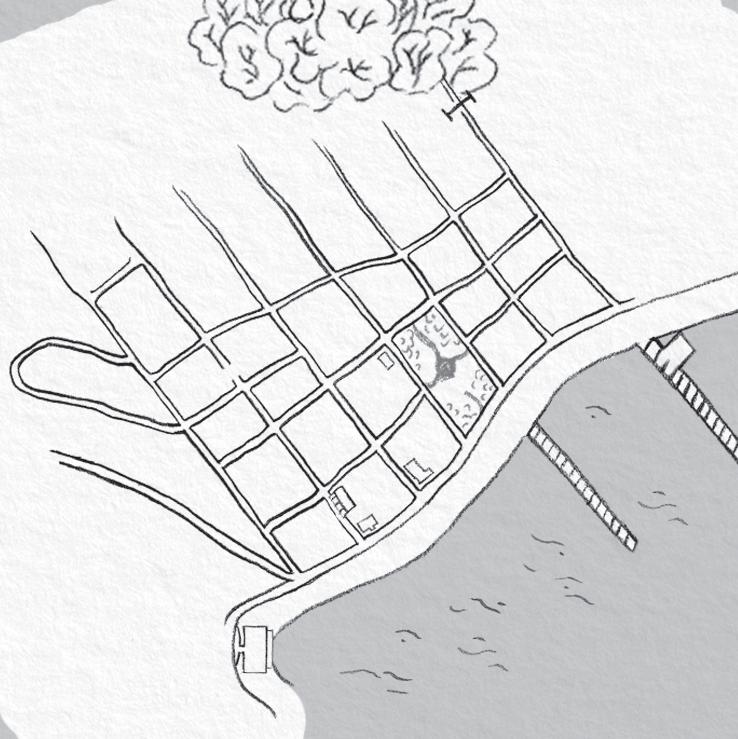Prologue
ANN E. KEYHEART STANDS IN the front hall of the Captain’s Cottage, her mouth still hanging open from the blood-chilling scream that brought me sprinting the seventyeight yards back to her door. Not to brag, but if the 78-yard dash was a thing, I would have totally broken the world record. It’s even more impressive when you add these details: it is after ten o’clock at night, the path is poorly lit, and I’m weighed down by the five pounds of plaster cast that’s holding my broken right arm in place.
“Whathappenedareyouokay?” I say between breaths while I push the door wide open and barge inside. Captain Edward Cheevers’s dark, intense eyes stare down disapprovingly at Keyheart from his portrait on the wall.
“Dead,” she says in a voice that lacks any emotion. “She’s dead.”
1
You know, I’d better stop here, because I’m getting ahead of myself. If you understand soccer, what I need to do is back pass to the goalie and reset. So, let’s back up a few hours so I can explain exactly why I was seventy-eight yards away from the Captain’s Cottage, on the dark path between it and the Islander Hotel, at the very moment that my favorite author discovered a dead body on her living room floor.
2 michael d . beil
chaPter 1
THERE IS NOTHING UNUSUAL ABOUT the way the day starts. Pip, my ten-year-old sister, is the first one awake, galumphing down the stairs and out to the barn to feed and say good morning to Tinker, her horse. Our stepfather, Thomas, is next, making coffee and ransacking the refrigerator for eggs and milk, when I make my appearance.
“G’morning, Lark. Perfect timing. Can you make up pancake batter with one arm? Good. Great. Bacon or sausage?”
“Bacon,” I say, pouring the mix into a bowl and reading the directions.
Fifteen minutes later, as I’m flipping the last batch of pancakes, his three boys—my stepbrothers Blake, Nate, and Jack—stumble in, one zombie after the other, drawn to the smell of frying bacon.
3
Pip, as usual, chatters almost nonstop through breakfast, sharing stories of the previous day’s UNBELIEVABLE and FANTASTIC adventures with Tinker, and outlining her (and Tinker’s) plans for the new day. The rest of us nod or grunt occasionally so she doesn’t think we’re ignoring her. In our crazy, mixed-up family of six, Pip is the only true “morning person.” After I’ve had my orange juice (in my favorite vintage Judy Jetson glass) and a stack of pancakes, though, I come to life.
It’s a big day—another in a series, it seems—for me. It’s the opening day of Swallowtales, Swallowtail Island’s annual book festival, which promises to pack every hotel and B&B on the island with wannabe writers of every age. Two hundred aspiring writers are coming to take classes and to “workshop” their books, stories, and poems with other writers. It’s also an opportunity to meet and discuss their work with publishers, agents, editors, and a handful of bestselling authors.
What does all this have to do with Meadowlark Elizabeth Heron-Finch, you ask? That’s easy: Nadine Pritchard, the famous writer who was my mom’s best friend when they were kids, just happens to be on the board of directors of Swallowtales. Right after we arrived on the island in June, she hired me to be her assistant, and together we solved the seventy-five-year-old mystery of her grandfather’s murder. Along the way, we also stirred up a hornet’s nest involving the wealthy and important (on Swallowtail Island, at least)
4 michael d . beil
Cheever family and a few hundred acres of extremely valuable real estate.
When Nadine first asked if I wanted to be a page, which is sort of an assistant to one of the bigshot authors or other VIPs, I was less than enthusiastic, until I saw the list of authors.
“Can I be her page?” I asked, pointing at the name “Ann E. Keyheart.”
“Ann Keyheart? Really? Why?” Nadine seemed surprised.
“She’s, like, my favorite author. I’ve read The Somewhere Girls a million times. I know, it’s not like me at all. All that teen drama. And you know, the really big secret that they all promise never to reveal. So cheesy. I usually hate that stuff, but I can’t help it. It’s so . . . good. Have you read it?”
Nadine shook her head. “No, but I know of it. I visited a girls’ school in New York last year to talk about my books, and I’m pretty sure every girl there was reading it. Tough competition for a nonfiction book about the civil war in Somalia.”
“Have you ever met her? Ann Keyheart, I mean.”
“No. I understand that she used to be a Swallowtales regular, but stopped coming a few years back when her career really took off. We hadn’t even asked her this year, figuring it would be a no, but then her people reached out to us a few weeks ago. Said she wanted to do it, and didn’t even care about the money. She’d do it for free. Kinda hard to say no to that. You really want to be her page?”
“Uh-huh. Yeah. I mean, she’s not crazy or anything, right?”
5 betrayal by the book
“Well, speaking as a writer, I think all writers are at least a little crazy. But if you want the job, you’ve got it.”
It is the boys’ turn to clean up after breakfast, and I have a half hour to kill before heading to the Islander Hotel for my first duties as an official Swallowtales page, so I return some texts. It wasn’t until the second week of August that we made the family decision to stay on Swallowtail Island, and ever since I told all my old friends back in Connecticut, they have been freaking out. They can’t believe that I am choosing to live on a tiny island in Lake Erie—with a year-round population of about two thousand, with no cars, and in Ohio, for goodness’ sake. I might as well be moving to the moon as far as they’re concerned. And now, with less than two weeks of summer vacation left, they’re bombarding me with texts about how horrible my life is going to be. I have to give them credit for doing their research, at least. Thanks to them, I know that the average size of the graduating class at Swallowtail Island High School is forty-five, and that the soccer team hasn’t won a game in more than two years. And that sometimes grocery stores run out of food because the lake is frozen and the ferry can’t get to Port Clinton.
“Hey, listen to this,” says Thomas, pointing to something in the Swallowtail Citizen that had arrived the day before. “It’s a letter to the editor.”
6 michael d . beil
ò
I roll my eyes at him. “So?”
I know, I know. What can I say? I’m twelve, I’m an orphan, and I live on an island. In Ohio. And sometimes the voice in my head (my mom’s) telling me to be nice is too late for me to stop myself. At this point, though, Thomas knows me well enough not to take it personally.
“Trust me, you’ll be interested,” he says. “Some woman who read about you in last week’s paper. Roseann Flaherty.”
It’s true. After Nadine and I solved her grandfather’s murder and found Captain Edward Cheever’s missing will—a will that, among other things, might make Pip and me the owners of about three hundred acres of valuable land on Swallowtail Island—the Citizen ran a big story about me. Now, before you start thinking I’m famous or something, you need to know that the Swallowtail Citizen is not exactly the New York Times.
“Does she want to buy some land, or is she offering to sell it for me?” It’s a legitimate question. When word got out about the will and the land, we had to stop answering the phone because we were getting so many calls from real estate agents.
“It sounds to me like she’s writing about the book you’re looking for—the one from the English bookstore.”
I sit up straight in my chair. Now Thomas has my undivided attention. Right after we arrived at the Roost, our house on Swallowtail Island, I found a tree swallow (Iridoprocne bicolor, to be precise) made of silver, along with a copy of The Pickwick Papers by Charles Dickens that had belonged to my mom.
7 betrayal by the book
Strangely, the pages were cut out in the center of the book to make a secret nesting place for the bird. Inside the front cover was a stamp from Crackenthorp Books in London, so I wrote to them to see if they knew anything about the bird. A few weeks later, I got a response from Mr. Archibald Crackenthorp, who wrote that he didn’t know anything about the bird, but that a second Dickens book, Little Dorrit, had also been sent by his father to the same address around 1940.
When the guy was interviewing me for the story in the Citizen, he was kidding around at the end of his visit, calling me Nancy Drew and asking me about my next case. All I’d said was that I was looking for a book with a cutout for a little carved bird—that I’d heard there was a book like that somewhere on the island, and I was going to try to find it. I didn’t say why, or how I’d heard about it, or anything about already having one like it.
“I told you you’d be interested,” Thomas says as I read over his shoulder.
“What does she say?”
Thomas continues: “Apparently your story triggered a memory of seeing a book with a bird hidden inside, like what you said you were looking for. She thinks that the bird was tan or brown all over, like a wren or a sparrow. It would have been around nineteen seventy-six, when she was in the fourth grade. A classmate brought it in for show-and-tell.”
“Does she say anything about the book? The title?” I ask.
8 michael d . beil
“Or the name of the girl who brought it in?”
“Uh, let me see. She doesn’t remember the girl’s name . . . the family moved off the island sometime afterward, but she remembers that the girl lived in a big house on Buckeye Street. A yellow house.”
“There’re no yellow houses there,” I say. I cut across Buckeye on my bike on my way into town all the time and I would have noticed a yellow house.
“It’s been forty plus years. Houses change colors. Change in all things is sweet, according to Aristotle.” He looks closely at me, waiting for the inevitable eye roll, but I deny him the chance to be right. “Anyway, it’s a clue, which is more than you had ten minutes ago.”
“Maybe it’s a clue. Maybe not.”
“But you’re going to look into it.”
“Well, in the words of Larkus Maximus, duhhh.”
The job of a Swallowtales page is not complicated. In our training sessions, the organizers stressed a few key things. Number one, chauffeur the VIP from the ferry dock and help out with the check-in process. Deliver the information packet containing class rosters, schedules, invitations, and tickets. Then a quick tour of the Islander Hotel, where most of them are staying, and where all the classes and workshops will be held. We
9 betrayal by the book
ò
all received training on the photocopy machine and how to get VIPs connected to the Wi-Fi and a printer if they want. After that we’re basically “on call,” a text message away from whatever they want, whether it’s a cup of coffee, a ride into town on one of the hotel’s golf carts, or twenty copies of a handout for their class. “Be there if they need you, and stay the heck out of the way if they don’t” we were told.

I’m supposed to meet Keyheart at the ferry dock, where she’s due to arrive on the Niagara at eleven o’clock. Dressed in the official page uniform of khaki shorts and a peach-colored polo with the Swallowtales logo embroidered on the front, I take the keys to one of the hotel’s electric golf carts and drive to








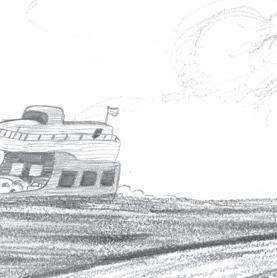
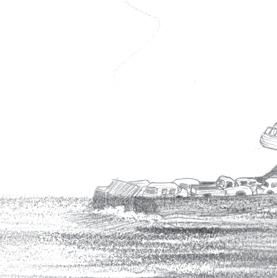

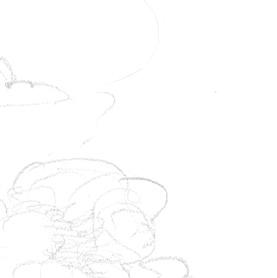






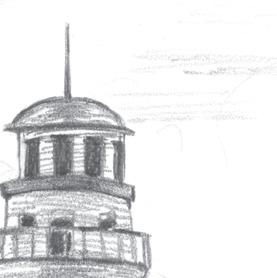




10 michael d . beil
the lighthouse at the point. As I skid to a stop a few steps from the water’s edge, the Niagara has just passed the outer channel markers and is heading for the red buoy that’s no more than fifty yards from where I sit. From there, it has a straight shot to the dock, but I have plenty of time to get there. Once it reaches shore, there are lines to be made fast, ramps to be lowered, and gates to be opened before anyone can disembark.
The starboard railing is lined with passengers pointing at the lighthouse and, of course, capturing the moment of their arrival on Swallowtail Island on their phones. As the Niagara slips past me, a lone woman is standing in the shadows at the stern, leaning nonchalantly against the railing as if she’s made the trip a million times. I think to myself, Must be an islander— definitely not a tourist. Then, while I’m reaching down to turn the key in the golf cart, she glances over her shoulder and casually tosses something overboard. I can’t see what it is, but my brain registers a flash of black and white stripes, exactly like the ones on a can of CoffLEI, a coffee-flavored soda made on Put-in-Bay. (Its short for Coffee of the Lake Erie Islands, in case you’re wondering.) Whatever it was, it really ticks me off, because, geez, there are trash cans and recycling bins all over the stupid ferry. Before I’m able to get a decent look at this Neanderthal, though, she disappears into the crowd along the rail. Annoyed, I step on the accelerator and kick up some gravel as I spin the cart around and head for the road to the ferry dock.
11 betrayal by the book
By the time the Niagara is tied up and passengers have begun to disembark, I have parked the golf cart in the lot and I’m standing outside the terminal holding up a sign that reads: A. KEYHEART . I know what she looks like, although I’ve been warned by more than one person that the author photo in all her books is several years old and “ definitely Photoshopped.” Passengers file past me, some making the expected jokes (“If I say I’m A. Keyheart, will you take me to my hotel?”) but still no Keyheart. Finally, as I’m about to give up, a young woman clambers down the ramp, spots me, and waves. She’s lugging three large suitcases and has a full pack strapped to her back.
“Hello! Thank you! I was worried you’d already gone,” she says. She points to the sign. “That’s me.”
I’m not so sure; she looks like a college kid. I know they can do wonderful things with cosmetic surgery these days, but this is ridiculous. I look at the sign, then back at her. “Uh . . . are you sure . . . I’m waiting for the author, um, Ann Keyheart.”
“Yeah, I know. I’m her P.A.”
“P . . . A?”
“Personal assistant. Didi.”
“Oh. Right.” This is the first I’ve heard about an assistant, personal or otherwise. “I’m Lark, your, er, Ms. Keyheart’s page for the week. I’m so sorry. I wasn’t expecting . . . ” I take one of the suitcases from her and stack it on the back of the cart.
“No problem,” she says, pushing her sunglasses up and turning to take in the view of town from the dock. Her free hand
12 michael d . beil
goes to her mouth, but not before a quiet “oh” slips out, and her lovely green eyes turn watery.
“Are you . . . okay?” I ask.
She shakes her head quickly, as if to break out of a trance, and covers her eyes with her sunglasses. “Yeah. Good. Okay. I just . . . oh, there she is. Finally.”
A woman in a lime-green linen pantsuit appears at the top of the ramp, stopping to pose as if she’s waiting for the press to greet her on the red carpet at the Oscars. Her big moment is ruined, though, when a gust of wind takes her hat, and after a brief, swirling flight, deposits it in the harbor.
“Oh! My hat! No! That’s from Harrods! Didi! Hurry!”
I run toward the ferry, thinking that I might be able to rescue the hat if I can find a boat hook, but it is not to be: the wake from a passing boat washes over it and it sinks before my eyes.
“Annnddd there it goes,” says Didi. “Right to the bottom. Like the Titanic. I hope that’s not an omen for the week.”
“After I drop you off at the hotel, maybe I can come back and look for it,” I say.
Didi shakes her head. “Don’t worry about it. In fifteen minutes, she won’t even remember that she had a hat. Harrods my butt. Marshalls, more likely.”
Keyheart, barely five feet tall in her matching green espadrilles, slowly makes her way down the ramp, all the while staring sadly at the spot where the hat disappeared. I get my
13 betrayal by the book
first good look at her, and mentally compare the woman before me with the younger, thinner, redder-haired, and somehow, but most definitely, taller person in the photograph that I was so familiar with.
“Hi, Ms. Keyheart, I’m Lark,” I say, holding out my (castfree) left hand, which she leaves hanging for a long second before giving it a quick shake. “Your page for the week. I just want to say how happy I am to be able to—”
“You’re my . . . oh, that’s just perfect. A one-armed page. Are you even old enough to drive that thing?” she asks, pointing at the hotel golf cart.
“Yes, ma’am. Don’t worry about my arm. And you only have to be twelve to drive golf carts on the island.”
“Good grief. I’m being chauffeured by a child. A child with a pituitary problem, apparently,” she adds, backing up a step so she can take in all sixty-eight and a half inches of me. “Are your parents in the circus?”
Didi buries her face in her hands. “Actually, they’re dead,” I say, smiling sweetly. “But they were both tall.”
“O-kayyy. On that note . . . Maybe we should get going,” Didi says, guiding Keyheart into the seat next to me while she climbs into the back seat.
I press down on the accelerator and off we go, with Keyheart holding on for dear life and wondering aloud about the lack of seat belts.
When I pull up outside the hotel lobby, I say, “We need to
14 michael d . beil
stop here to get you checked in, and then I’ll take you to your cottage.”
In addition to the main building, which has forty-eight rooms, the Islander Hotel has half a dozen “private cottages” for very special guests. Although she offered her services for free for the week, Keyheart had requested the Captain’s Cottage, the newest and most luxurious of the bunch, with a deck that extends well out over the lake. It is named for Captain Edward Cheever, the famous sea captain—yes, the same one whose long-lost will I found, and whose land Pip and I might now own. His name and face are pretty much everywhere on Swallowtail Island.
“I’ll take care of it,” Didi says to Keyheart. “Can I have my phone back?”
Keyheart makes a face, sucking in a deep breath. “Oh. Riiight. Your phone.”
“What?” says Didi. “Where is . . . no! You didn’t.”
Keyheart nods. “I’m afraid I did. I’m really, really sorry. I made my call, and then, I don’t know what happened. One second I was holding it, and the next . . . ”
“Did you leave it on the boat?” Didi asks. She starts to climb back aboard the cart. “Maybe we can get back before it leaves. Come on!”
I’m ready to make the drive back to the dock, but Keyheart is shaking her head. “It’s not on the boat. I . . . it went over. The side. Ker-plunk.”
15 betrayal by the book
“No. No, no, no!” Didi repeats. “How did you . . .that phone is my life. What am I supposed to . . . how can I even do my job?”
“Let’s not be melodramatic, dear,” Keyheart says, and I cringe, knowing how I would respond to somebody telling me not to be melodramatic. “You millennials and your phones! When I was your age, do you know what we had? Pay phones! You did bring your laptop, right? There you go. Problem solved. I would think you’d be happy to spend a few days away from all that technology. When we get back to New York, I’ll buy you a new phone, anything you want. And myself a new hat.”
Didi, eyes squeezed shut and hands folded atop her head, stamps toward the lobby, so I follow her inside.
“Sorry about your phone,” I say. “That sucks.”
“She’s killing me,” says Didi. “That’s not even the first one that she’s lost. She forgets to charge hers, and borrows mine. And then loses it. And did you notice, she won’t admit that she dropped it. No, because that would be taking responsibility for her actions. No, it went overboard, like a fairy magically grabbed it out of her hands. She’s such a child. Argh!”
“Do you want me to see if I can get you a phone?” I ask.
Didi takes a few calming breaths and leans her forehead against a varnished pillar in the lobby. “No. No. I’ll survive. It’s just the principle of the thing. Look, I’m sorry for ranting. That wasn’t very professional. I shouldn’t complain. She’s
16 michael d . beil
really not that bad, and she’s helping me with my own writing. Come on, let’s get us checked in.”
“There’s a line at the check-in, so I’ll just grab your keys for now. You can do the rest later, whenever you want. It will only take a minute. There’s coffee and doughnuts and stuff in there if you want,” I say, pointing into a small room off the lobby. “Help yourself.”
“Yeah, maybe,” she says. “I could use the caffeine.”
When I return with the key cards, Didi has a large paper cup of coffee in her hand and is admiring one of the many sailboat paintings that adorn the walls of the Islander. Standing next to her is a woman sporting a name tag identifying her as Jean Morse from Lightwood Books.
“Hello! Welcome to Swallowtales,” she says, turning to Didi. “I’m Jean Morse. I see you’re already being taken care of by one of our terrific pages. It’s great that they get so many kids from the island involved, don’t you think?”
“It is. Really nice,” Didi says. “Hi. I’m Didi. Didi Ferrer. It’s so nice to meet you, Ms. Morse.” She pauses, as if waiting for the name to ring a bell, and then adds, “Ann Keyheart’s P.A.”
Ms. Morse nods at the mention of Keyheart’s name, silently mouthing an ahhh. “Wonderful. I was so happy to hear that Ann would be joining us this year. She caught me by surprise.”
“Me too,” Didi says.
Neil Derry, the hotel manager, appears at Morse’s side. “I apologize for the interruption, Jean. We have a slight . . . logistical
17 betrayal by the book
situation, if you will. I’m hoping you can help us sort it out.”
“Certainly. Didi, it was a pleasure meeting you. I do hope to see you again. And tell Ann I’m looking forward to talking tonight,” Morse says, turning and following Derry to the counter.
As Morse walks away, something about the way Didi tilts her head and twists her lips tells me she’s confused.
“Everything okay?” I ask.
Didi’s eyes follow Morse until she ducks into the room behind the check-in desk. “Yeah, I guess. That’s Keyheart’s new editor. Or she will be if she ever actually writes another book. I-I was under the impression that . . . I mean, Keyheart supposedly talked to her about my . . . maybe she didn’t. Why would she . . . I’m so confused.”
“I’m sure she has a million things on her mind,” I say. “She’s probably met a hundred people today. Maybe she just didn’t make the connection.”
“Yeah. Maybe,” Didi says, but it’s clear she doesn’t believe it.
The Captain’s Cottage definitely lives up to the hype. Lots of houses on the island have great views, but this is the first one I’ve been in that actually feels like you’re on the water. It was designed by a naval architect, and the waterfront side resembles the front end of a ship, with the bow pointing out over the
18 michael d . beil
ò
lake. Pretty cool. Inside, it looks like the cabin of a yacht, with teak-and-holly floors, and lots of brass and built-in furniture. And overseeing it all are the dark, piercing eyes of its namesake, Captain Cheever, whose portrait hangs over the fireplace mantel.
“Yes, this will do nicely,” Keyheart says, standing behind a wall of glass in the living room. “What is that Mark Twain quote? I have simple tastes. I’m always satisfied with the very best.”
“That wasn’t Mark Twain. It was Oscar Wilde,” says Didi, dragging Keyheart’s bags up the stairs to the master bedroom.

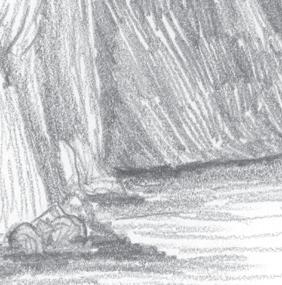

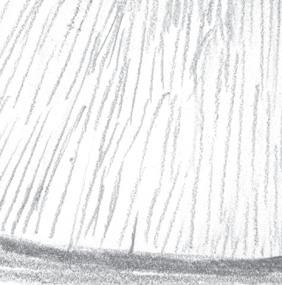

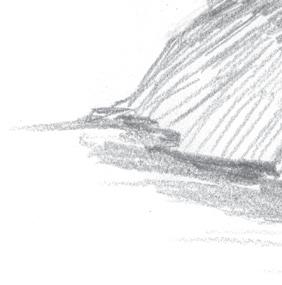
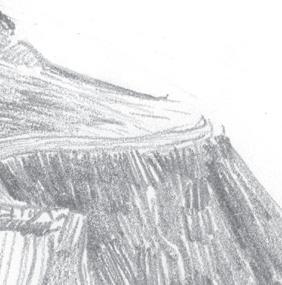

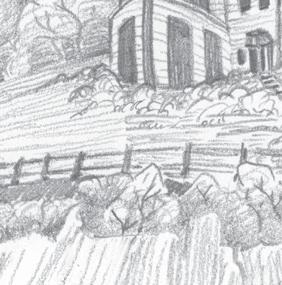
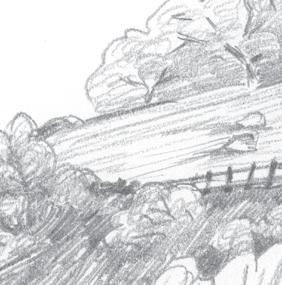


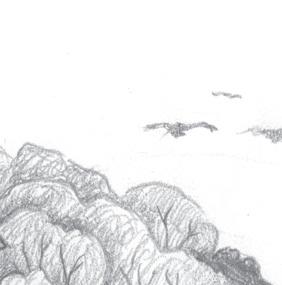


“What’s that?” Keyheart says, scrolling through messages on her phone.





19 betrayal by the book
Didi stops momentarily and shakes her head. “Never mind.”
“I’m supposed to tell you that there’s a case of the sparkling water you asked for in the kitchen,” I say. “I can show you how to use the coffee maker if you want. It’s one of those with the little pods.”
Keyheart waves off that suggestion. “I won’t be making my own coffee. That’s what Didi is for. Or room service.”
I point to a rustic woven basket on the kitchen counter. “That’s a welcome gift for you, of, uh, things from the islands. There’s a bottle of wine and some taffy from Put-in-Bay, and a bunch of other stuff. Some lady here on Swallowtail wove all the baskets.”
Keyheart doesn’t even bother to look inside, dismissing it with a whatever wave of the hand. “That reminds me,” she says. “There was one more thing I asked for. Something important.” She opens the kitchen cabinets, slowly at first but then more frantically until she reaches into the last one and her hand emerges clutching a bottle of scotch. I recognize the bottle because it’s the same one Thomas keeps around in case we have someone over who drinks it. “Figures. They didn’t spring for the really good stuff, but I suppose I can make do.”
“Anything else I can do for you before I go?” I ask as she twists off the cap and pours two inches of the brown stuff into a water glass.
“Didi!” she shouts. “This calls for a celebration. Where’s that box of chocolates I packed? Our little broken-winged
20 michael d . beil
friend here needs one. You do like chocolate, don’t you?”
“Yeah, I guess. I mean, unless it’s got weird stuff in it,” I answer, remembering the time that someone gave me a chocolate covered prune. Not cool.
“Well, these just might be the best chocolates in the world. And believe it or not, they’re made right here on the island. Keke’s Cocoas. I discovered them when I was here for my last Swallowtales. I’d almost forgotten how good they are, but when I signed on for this year’s gig, I decided I couldn’t wait till we got here, so I went ahead and ordered a few boxes. Didi and I have been gorging on them for weeks.”
I point to the basket that she’d snubbed a minute ago. “There’s a box of them in there, you know. I heard they’re pretty good.” I have looked in the window at Keke’s, but have never been inside, because the chocolates are displayed under glass, like jewelry. It’s not exactly the stuff people hand out at Halloween, if you know what I mean.
“They’re not pretty good,” Keyheart says. “They’re to die for. They are the food of the gods.” From the gift basket she lifts out the complimentary box of nine chocolate truffles, doublewrapped with green paper and cellophane. She reads the label and frowns. “These are milk chocolate. They’re good, but trust me, not as good as the dark. Honestly, I think Didi’s addicted to the dark ones.”
Didi then reappears with what looks to me to be an identical box and hands it to Keyheart, who passes it on to me.
21 betrayal by the book
She checks the label and nods. “Yep. Seventy-five percent cacao. That’s the stuff. Crack it open,” she says.
I don’t have much in the way of fingernails because I bite them, so I have a hard time finding a seam in the cellophane. Didi comes to my rescue by finding a paring knife in a drawer and giving it to me. I slice open the clear cellophane layer, remove it, and then turn the box over in my hands, looking for the edge of the wrapping paper so I can take it off in one piece—the way my mom taught me to open a present so the paper can be used again. (“Reuse, reduce, recycle” was like religion for Mom.)
“Good grief. Is this how you open presents on Christmas?” Keyheart asks. “It must be an all-day affair.”
“I-I thought you might want to keep the paper,” I say. “It’s really nice.”
“Oh, for crying . . . I don’t give two hoots about the paper. Open it!”
I slide a finger under a loose corner of paper and tear the whole thing off in one motion. There’s another layer of paper under the lid, covering the dark, almost black chocolates, so I set that aside and hold out the open box to Keyheart.
“My mouth is watering,” she says, lifting out a piece with a perfect coffee bean stuck on top and handing it to Didi. “You first. Because I lost your phone. It’s your favorite, right? The espresso ganache?”
Didi sets the chocolate on her tongue and closes her eyes.
22 michael d . beil
“See! She’s almost smiling. That’s as close as you’ll ever see. She can’t help herself. They’re too good. Your turn,” Keyheart says to me. “And don’t worry about nuts, in case you’re allergic. The green boxes are guaranteed to be nut free. Didi and I are both terribly allergic.”
“How do I know what’s inside?” I ask. Fool me once, and all that.
“Oh, for Pete’s sake! Ever hear of Forrest Gump? You never know what you’re gonna get! Live dangerously!” She hands me a simple-looking one from the middle. I give it a good sniff that reveals nothing and bite off a corner.
Keyheart watches me closely. “Well?”
“It tastes like soap,” I say, wondering if I can somehow make the rest of it disappear in my hand.
“Oh, you’re lucky. You got one of the rose creams. It takes fifty rose petals to make each one. They’re fantastic.” Keyheart then makes a show of closing her eyes as she makes her choice. “I love to be surprised. Ooooh! It’s spicy! Jalapeño and . . . cinnamon!”
Suddenly the bar of rose-flavored soap in my mouth doesn’t seem so bad.
Keyheart replaces the lid on the opened box and sets it on the counter. “I’ll leave the rest here. All yours, Didi. Well, maybe just leave one dark one for me, for later.” She then tucks the other box back into the gift basket. “I guess these are all for me,” she says, smiling. “Didi hates milk chocolate.”
23 betrayal by the book
“I’m not going to eat a whole box,” Didi says. “And for the record, I don’t hate milk chocolate. I just prefer dark.”
“Well, thanks for the, uh, chocolate,” I say, wondering how long it’s going to take to get the soapy taste out of my mouth. I set an index card with my phone number on the counter. “Here’s my number in case you need me. Or you can call the main desk. They’ll find me. There are copies of the schedule for the week in the living room.”
“What time is the kickoff ratfest?” Keyheart asks, scrolling through messages on her phone.
“The VIP dinner,” Didi translates, sensing my confusion. The tradition at Swallowtales is for the writers, agents, publishers, and editors to have an elegant kickoff dinner together before joining the big party with all the workshop participants at around nine o’clock.
“Oh. Yeah.” I reach into my back pocket and unfold my own copy of the schedule. “Cocktail hour starts at six thirty. Dinner at seven thirty. Are you both—”
“No, just me,” Keyheart says. “Didi has her own plans. She’s been invited to go yaaachting by some old friends of mine. So exciting! You’re going to love it. I think I’ll go rest my eyes for a minute.” She toddles off toward her bedroom, glass of scotch in hand.
“I’ve been sailing before,” Didi tells me, “and believe me, I’m not going to love it. It’s so boring. Can you help me find the boat, at least? I had a text message with the name of the boat
24 michael d . beil
and the dock number, but . . . anyway, their name is Cheever. Roger. Or Reggie. Something with an R . I’m supposed to be there at four.”
Of course it’s Reggie Cheever. It just had to be the one guy on the island that truly despises me, and with good reason. Remember that three hundred acres I mentioned, the land that might now belong to Pip and me? Well, if I hadn’t come along and ruined everything by finding that old will, all that land would belong to the Cheever family, the descendants of Captain Edward Cheever.
“The Cheevers,” I say.
I must have made a face when I said the name, because Didi asks, “Do you know them?”
“You could say that. I know the dad, Reggie, and his son, Owen. Owen’s . . . okay, I guess. I’ll meet you back here around three thirty.”
“Do mind coming by a little earlier, like maybe . . . two thirty?” Didi says. “There’s something I’d like to . . . someplace I need to go. Will you still have one of those golf carts? Is that okay? I mean, you driving me around?”
“Totally cool,” I say. “I’ll see you then.”
25 betrayal by the book
AFTER LEAVING KEYHEART AND DIDI to enjoy the comforts of the Captain’s Cottage, I check in with Nadine, who, as Swallowtales chairperson, is organizing and overseeing all the evening events—the dinners, the readings, the welcome, the last-night gala, that kind of stuff.
“Perfect timing,” she says when she sees me approaching. “We finally got everything sorted out for tonight. The seating arrangements were rather complicated. You’d think that adults would be able to act like adults. It’s more like middle school. This one doesn’t want to be at the same table as that one. And that one refuses to sit next to this other one.”
“You did say that writers are all a little crazy.”
“That’s true, I did. Between you and me, though, this group is especially petty. So, tell me about your day so far. How is
26
chaPter 2
your favorite author anyway? Is she settled in? And what do you think of the Captain’s Cottage? Beautiful, isn’t it?”
“Yeah, it’s great,” I say.
“And the celebrated Ms. Keyheart?”
“She’s . . . different. Not what I expected.”
“You know what they say about meeting your heroes,” Nadine says.
“I keep telling myself that she wrote The Somewhere Girls, my favorite book in the whole world.”
“That’s a good way to think about it. Keep the art separate from the artist.” As another girl in the page uniform comes into the lobby from the patio and walks toward us, Nadine says, “Have you met Gabby? Gabby Bensikova, Lark Heron-Finch.”
“Hi,” I say with a little wave.
Gabby, a head shorter than me and attractive in an uptight overachiever kind of way, looks me up and down. “Oh. So you’re Lark. I’ve heard about you.”
“Oh. Uh, okay,” I say.
“It’s a small island,” Nadine reminds me. “Gabby lives in New York, but her family has had a summer place here for forever. All the way at the east end of the island, past the beach.”
“The nice part,” Gabby adds.
“I think all of the island is the nice part,” says Nadine. “I’d forgotten that you were in Europe the week of the museum gala—you would have met Lark there.”
“Oh, yeah,” Gabby says. “I’m sure my dad would have signed
27 betrayal by the book
me up to work whether I wanted to or not. I heard it was a good party, though.”
“This week,” says Nadine, “Gabby is Howard Allam’s page. Have you read his book Final Edits ? ”
“He’s a genius,” Gabby proclaims.
I shake my head with a little shrug. “Sorry, I haven’t . . . ”
“Lark is working with Ann Keyheart,” says Nadine.
“Oh, right. Young adult,” Gabby says with a smirk. “What was it, The Somehow Girls?”
“Somewhere. The Somewhere Girls,” I say.
“Whatever. It was so . . . predictable, wasn’t it? Like, I didn’t see that twist coming from a mile away.”
I try to speak, but no words come out, so I end up standing there with my mouth open and glaring at the snooty girl who has just insulted my favorite book. Inside my head, I hear Mom’s voice: “Let it go, Lark. Choose your battles.”
“Well, that’s why we have events like Swallowtales,” Nadine says, coming to my rescue. “Different strokes for different folks. There’s something for everyone.”
“Mom says the festival is becoming too democratic,” says Gabby. “She says it used to be for serious writers.”
“Gabby’s mom is on the board, too,” explains Nadine. “She’s in the publishing business.
“Oh! There’s my mom now,” Gabby says. “I’ve got to run. It was nice meeting you . . . ”
“Lark,” I say.
28 michael d . beil
“Right. Lark. That’s . . . interesting. See you tonight at the thingy, I’m sure.” She pirouettes elegantly and runs after her mother, who waved at Nadine before heading into the Oliver Hazard Perry, a large conference room that is the site of Swallowtales headquarters. It is also acting as a kind of teachers’ lounge for the authors, agents, and editors, who are the reason so many writers are thrilled to snag one of the two hundred available spots in the conference. Well, that and the fact that Swallowtail Island is a great place to spend some time in August.
As the door shuts behind Gabby, I shake my head. “Geez. Pretentious much?”
Nadine laughs. “Don’t let her get under your skin. She’s grown up in a family that is, let’s say, very artistic. Her father owns a big gallery in SoHo, and her mother’s a senior editor at Lochmoor Books, like a real bigshot. She discovered Victoria Zabatsky, who just won the Weller Prize. Impressive stuff. And Gabby has danced with ABT and the New York City Ballet. A serious bunhead. She’s incredibly talented. Of course, she knows that. You get used to her. So, what’s next for you?”
“Didi, um, Keyheart’s assistant, got invited to go sailing, so I’m gonna take her over to the marina at four. Guess who invited her? Reggie Cheever.”
“Eek. Poor kid. How does she know him?”
“She doesn’t. Keyheart does. Sounds like she knows
29 betrayal by the book
everybody. You wouldn’t happen to know where he keeps his boat, would you? His sailboat, not the one I sank,” I say with a grin.
“It’s at the yacht club, not the town marina. Don’t worry, you can’t miss it. It’s the biggest boat there.”
“What a surprise,” I say.
Didi is drinking a Coke on the patio of the hotel when I return from my little break at about two fifteen. She lowers her sunglasses and waves at me from a wicker couch that’s placed to provide a perfect view of the lighthouse with the lake in the background.
“So, A.K. didn’t scare you off. I wasn’t sure I’d ever see you again. There’s still time. Run!” she shouts, laughing. “Save yourself!”
“I’m good,” I say. “Really. I mean, yeah, she’s . . . different from what I expected. I don’t really know what I . . . I love her books, so I figured she . . . ”
“So, did you find out where this boat is? Please tell me it sank. There was a terrible fire. Or they left without me.”
“Oh. Uh, no. I mean, yes, I know where it is, if you still want to go.”
“I don’t want to go. But she wants me to go, so I go. They’re her friends, and I need her on my side right now.”
30 michael d . beil
ò
“Why isn’t she going?”
“Officially, or unofficially? Officially, because she’s too busy. She’d love to, dahhling, but there’s just no time in the schedule. Unofficially, she hates boats and she’s not that crazy about her so-called ‘friends.’ So she sends me. It’s not that bad. Part of the job.”
“How did you get to be her assistant?” I ask.
Didi shrugs. “Good question. I’m not really sure. I’ve only been out of college for a couple of years. I’m going to be a writer, so I figured that working in publishing would be a good way to learn about the business, what kind of books they’re looking for, that kind of thing. Anyway, it was kind of random. I’m in the middle of interviewing for this editorial assistant position at Keyheart’s publisher when she just barges into the office and starts telling the guy interviewing me how much she needs an assistant. I didn’t even know who she was. She sees me and starts asking me all these questions. Can I do social media stuff? Do I know how to book flights and hotel rooms? Do I live near her, so I can basically be on call 24/7? Somehow the food allergy thing comes up and turns out that we’re both super allergic to nuts, but nothing else. Next thing I know, I’m learning how to make a soy milk latte, cleaning her cat’s litter box, and posting pictures of boxes of Keke’s Cocoas on her Instagram account. That degree from Columbia is really coming in handy.”
“It must be cool, though. I mean, you get to read what she’s writing way before anybody else.”
31 betrayal by the book
“You’d think so, wouldn’t you?” she says. “The fact is— between you and me—I’ve been with her a year and she hasn’t written a single word.”
“Really? I thought writers wrote every day. Isn’t that what they’re always saying?”
“I know, right? I thought I’d be helping her with research and reading her early drafts and making suggestions . . . Ha! What a joke. As far as she’s concerned, I’m a gopher. I make coffee and pick up her dry cleaning and answer her emails and make restaurant reservations for her—not that I ever get invited to go along. This week is the first time. The good news is that I have lots of time to write. And unlike her, I follow Epictetus’s advice: ‘If you wish to be a writer, write.’ So I do, every day.”
“Geez, you sound just like my stepfather. He quotes that Epictetus guy all the time.”
“Oh, yeah? Well, he is the go-to guy for us Stoics.” She stands, slips her backpack on, and takes a deep breath. “Okay. You’re still cool if we take a little detour?”
I nod. “Nowhere I have to be for a long time. The cart is in the parking lot.”
“Awesome. Now all I have to do is remember where we’re going.”
When they get to the cart, Didi takes out a map of the island and, with her finger, traces the road from the hotel up to Lake Road, and then east almost to the very end. “Somewhere around here,” she says, pointing to the last fork in the road.
32 michael d . beil
“That’s where you want to go?” I ask. “There’s, like, nothing out there.”
Didi taps her finger on the spot on the map and nods, so I step on the accelerator. Like Thomas is always saying, “Mine is not to reason why,” and all that. We rumble down the gravel road for a few minutes in silence until Didi finally breaks the spell.
“So, have you lived here all your life, or what? What’s it like in the winter? Pretty dead, I’ll bet.”
“We just moved here, this summer,” I answer “From Connecticut. We had a house here, though, for a long time. My mom’s family. This is gonna be my first winter here, though.”
“Oh, yeah? Where in Connecticut?”
“Essex. You know it?”
Didi nods. “Sure. One of my roommates at Carton was from there.”
“You went to Carton Academy? I’m thinking about going there. Or, I was before we moved. Now I’m not so sure. I guess I’ll wait and see what going to school here is like.”
“If you have the chance, you should definitely go to Carton,” Didi says. “Are you, like, a basketball player or something?”
At twelve years old and five-feet-eight-and-a-half inches (and still growing), I get that a lot. “Soccer.”
“Well, then you have to go. The soccer team wins all the time. The girls’ team is one of the best in the country. One of my best friends played. She went to UNC, and now she’s
33 betrayal by the book
playing for a team in England. Crazy. If you want to talk to her about what it was like, I could totally help you out.”
“Y-Yeah, definitely,” I say. “Omigosh. I would love that.”
“I’ll call her this weekend. I owe her a call anyway.”
A moment later, as we’re passing a spot where we have a view of the lake, she points out at the deep blue water with Feather Island in the background. “I guess this isn’t bad, though. It’s prettier than I remember.”
“Oh. I didn’t . . . You’ve been here before?”
“Not for a long time. My grandmother had a summer house here.” For the second time, I see Didi’s eyes grow watery, but this time she doesn’t try to hide it. “She . . . died a few years ago, and they sold it. I want to see the house, but I’m not ready . . . yet. Maybe tomorrow. I’d really love to go inside, but I doubt that’s gonna be possible. I probably won’t have time anyway. I’m at the mercy of A.K.,” she says, sniffling and wiping away the one tear that had escaped. “There’s a lot going on. She might need me.”
A mile farther along, I slow down as we approach the fork that Didi had pointed to. “I think this is it.”
Didi looks ahead down the road—now just a grass path, actually—and smiles broadly. “Yes! This is it. I remember. Keep going!”
It’s a short trip, as the path ends at the shore, a couple hundred yards away. Didi hops out of the cart and points out at Big Egg Island, which, in spite of its name, is quite small. “That’s where we’re going. Big Egg.”
34 michael d . beil
I look up and down the footpath that runs along the shore for a boat, but there’s nothing in sight. “Ummm . . . how are we getting there?”
“Follow me.” Didi takes off down the path ahead of me, stopping at a large flat rock right at the water’s edge. She sits on the rock and starts to take off her shoes.
“We’re walking?” I say.
“Yep. Carry your shoes. You’ll need them.”
“You’ve done this before? It seems kinda far.” Despite my doubts, I kick off my sneakers. She wades out into the lake, feeling the bottom with her feet. “I did it the last summer I was here, when I was twelve. There’s a sandbar—it’s kind of narrow, though. I seem to remember my shorts getting a little wet. But then, I was a lot shorter than you.”
I follow her into the warm, smooth water, my toes digging into the sand, and together we wade across the narrow channel, holding our shoes over our heads. Only once, when I got distracted by a noise on the island and took a step off the sandbar, did the water reach the bottom of my shorts.
“How did you find out about this?” I ask when we are standing on the rocky shore of the island.
“It was a summer camp thing. You could pick some of your activities. Most kids picked sailing or kayaking, but a couple of us went with this lady on these birdwatching hikes. The one here was the best. It was kind of a secret, I think. I don’t know if it’s still here, but there used to be an eagle’s nest up in one of
35 betrayal by the book
the tall trees on the far side. We got to see a baby bald eagle. The lady made us swear not to tell anyone. She was afraid too many people would come out here and bother it. But there’s something else that’s pretty cool, too. Follow me.”
She climbs up and over a fallen tree and leads the way to the center of the island. There is a small clearing where there are no trees, only rocks, including one that juts up about ten feet, with a flat top. Didi circles it, examining it from all angles. “I know there’s a way up because we did it. Yes! There. See this curvy ridge? It’s wide enough for your feet. You just have to hug the rock on the way up.”
Once again, she leads and I follow in her footsteps, fingers rubbing along the limestone all the way. With only one good arm, it’s a challenge, but nothing I can’t handle. When I reach the top, I stop to admire the view of the lake to the south, with Perry’s Monument standing tall and proud on Put-in-Bay. At my feet are rows of deep, curving grooves cut into the stone.
“Glaciers did this,” says Didi. “The last ice age, about twelve thousand years ago.”
“So cool,” I say, feeling the grooves with my hands.
“Actually, it was freakin’ cold,” Didi says with an apologetic smile. She turns her attention to a spot near the south edge. “Look over here.”
I join her, kneeling over a shallow indentation in the stone.
“Do you see it?” she asks, running a finger around its outline. It’s eight or ten inches across and about an inch deep. The
36 michael d . beil
edges are worn smooth and part of it is difficult to make out because of moss or lichen, but I have no trouble recognizing the general shape.
“It’s a swallow!” I say. “In flight.”
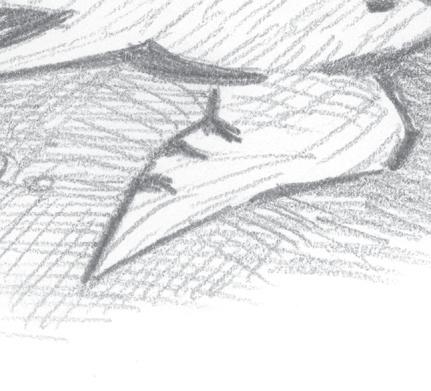

“I’m impressed,” Didi says. “You even know what kind of bird. That’s more than I knew the first time I saw it.”
“What’s the story? I’ve never heard of it.”
“I don’t think anyone knows for sure. Kate said it could be a petroglyph, carved by Native—”
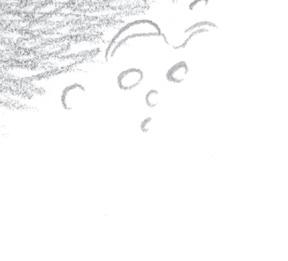

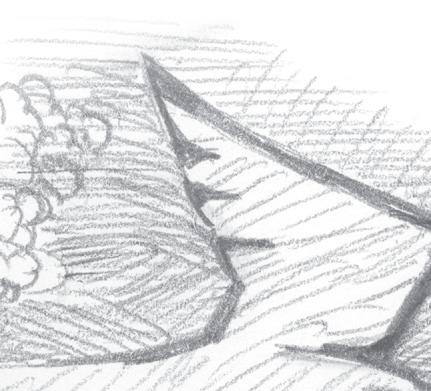

“Wait. Kate?” I say, my heart skipping a beat.
“Yeah, the lady I told you about. Her name was Kate . . . something. She taught at—”
“Kate Heron?”
Didi nods. “Yeah, that’s her. What’s going on?”
37 betrayal by the book
“She was my mom,” I say. “I’m Lark Heron-Finch. She was an ornithologist.”
“Whoa. That is weird. Omigosh. This is crazy, but I actually think I met you before. You’re about twelve, right? It would have been . . . eleven years ago. You were just a baby. Your name, though . . . I thought it was something with an M. Madison. Or Melanie. Or—”
“Meadowlark,” I say.
“That’s it! It was you! We stopped by her house one day on the way out to Rabbit Ear Point. I remember this one room—”
“The bird room. It looks exactly the same. She was obsessed, in a good way.”
“So . . . you still . . . live there?”
“Yeah. I, uh, kind of own it now. Me and my little sister inherited it from Mom. We’re with my stepdad now. And his kids.”
“Inherited . . . So she really did . . . When you said that earlier to Keyheart about your parents being . . . that was true.”
“Uh-huh. Afraid so. My dad died a long time ago, when I was five. Mom . . . This spring.”
“Omigosh, I’m so sorry. She was . . . amazing. So smart— no, more than that. She was brilliant, and funny and inspiring. I’ve never forgotten something she said when we were right here, on this rock. There were only four or five of us that day, and we were talking about whether it was some random accident of nature that just happens to look like a swallow, or if
38 michael d . beil
had been carved by Native Americans, or somebody else, and why . . . you know, why a swallow, why here, where no one can see it. Next thing you know, though, somehow we’re talking about the meaning of life, and philosophy, and mortality. . . . It was the first time in my life I was part of an actual, adult conversation, and I was absolutely spellbound.”
“Sounds like Mom. She never really treated us like kids.”
Didi continued: “She was saying how people really haven’t changed in thousands of years. That we have all wanted basically the same thing all along—to be remembered, to leave some kind of a mark on the world, a legacy. We want to believe that, in the end, somehow our short little lives mattered. We carve our names in stone and line them up in cemeteries and hope—hope —that the letters and numbers on our stone will mean something to somebody in the future. But the reality is, most of us are going to be forgotten pretty quickly.”
“I can hear Mom now,” I say. “She always said that just because something is carved in stone doesn’t mean it’s going to last forever. Sooner or later, those letters and numbers start to fade, just like this little bird.”
“Exactly. After camp that day, I walked over to the cemetery on the island and looked around. Your mom was right; I couldn’t even read the old stones—and they’re not even that old. I knew right then and there that I was going to be a writer. That’s how I was going to leave my mark. It’s been a long, weird journey—and I’ve made a million mistakes along
39 betrayal by the book
the way—including one really big one—but I’m finally there. And that’s why, when Keyheart told me we were coming to Swallowtail for the book thing, I just knew I had to find this place again, and put my hands on this little indentation—and remember the person, the day—that got me started.”
“That’s so cool. I have, like, goose bumps.”
“Weird, huh? My path in life determined by a dent in a rock that may or may not be a carving of a bird. And how crazy is it that it was your mom. I don’t even want to think about what kind of Twilight Zone-y twist of fate brought you and me together. The mind boggles. Anyway, thank you.”
“No, thank you,” I say. “Seriously. I love hearing stories about my mom from before I was . . . And you know, I think maybe she did tell me about this place once, a few weeks before she died. Or she tried to, at least. She was talking about Swallowtail, and all the things she used to do and her secret places. She said something about a rock, and a swallow—it wasn’t really clear, and she was having trouble staying awake and then . . . ”
I turn my head away from Didi as tears stream down my face, but she wraps her arms around me, squeezing me tightly. We stand there for a few seconds without speaking until she finally releases me.
“You okay?” she asks.
I do my best to compose myself quickly, sniffing and wiping my eyes with the bottom of my shirt. “Y-Yeah. I’m good—it’s just, you know, sometimes . . . ”
40 michael d . beil
“I do know,” Didi says. “All too well.”
“We should probably get going,” I say.
Didi lifts my wrist for a moment to read my watch, and then drops it, frowning. “I suppose you’re right. Not that I’d mind missing this boat.”
We clamber down from the rock and retrace our steps back to the shore, where we remove our shoes once again and wade out into the lake. When we’re about halfway between Egg and Swallowtail Islands, I say, “Back on top of that rock, you said that you were going to be a writer, and now you’re finally there. Does that mean that you’re writing a book?”
Didi turns around, smiling slyly. “Past tense. Wrote. Or present perfect. Have written.” She glances all around us to make sure no one is listening. “Don’t tell anyone, but I finished my first novel a few weeks ago.”
“Wow! Congratulations! That’s amazing,” I say as we reach the other side and head down the path for the waiting golf cart. “That must be so . . . What’s it about? Is it going to be published?”
“Thanks, but remember, shhhhhh.” She puts her index finger to her mouth.
“I don’t get it. Why is it—”
“I don’t want to jinx things by talking about it. Hopefully, I’ll get some good news this week. Remember Jean Morse, back in the hotel lobby? Keyheart’s new editor? Well, after I finished the book, I asked Keyheart to read it. Of course, she
41 betrayal by the book
made me print it out; she refused to read it on her computer. Anyway, she swore that she liked it, and she promised to send my book to her editor, Jean Morse. That’s why I was confused when we ran into her. I was hoping that she’d recognize my name, at least. But then I started to think: maybe she never got my book. It got lost in the mail. Or, the more likely scenario, Keyheart never got around to sending it. I had offered to box it up and everything, but she was like, no, I’ll take care of it. And when I asked if she’d heard anything from Morse, she got annoyed and called me an impatient millennial. First of all, I’m not a millennial. And second, like it’s bad to want to get things done. So a couple of days ago, when I never heard back from her editor, I went ahead and sent the first three chapters to an agent without telling Keyheart. She would kill me if she knew.”
“How come? I mean, isn’t that what you’re supposed to do? I work for a writer, too, and she’s always on the phone with her agent.”
“Well, I swear I didn’t know this until after I sent it, but I found out that the guy I sent it to used to be Keyheart’s agent. Something happened and she switched to a new agency before I started with her. I’m pretty sure she fired her last P.A. because of something to do with her old agent, so she will definitely fire me if she finds out I sent him my book. Anyway, he got back to me right away, and seems really interested, but I don’t want to count my chickens, you know?”
“Wow. So, this might be a big week for you, too. You must
42 michael d . beil
be so psyched. I can’t wait to read it. Come on, give me a hint. What’s it about?”
A small pendant—two interlocking D s—hangs from a silver chain around her neck, and she rubs it between her fingers. “For now, all I can tell you is that it’s a very personal story. It’s kind of my story, but a whole lot more. Going back to that whole ‘leaving your mark’ thing, I honestly don’t know if anyone’s ever gonna remember me because of this book, but it doesn’t matter. I put my heart and soul into it. That day on Egg Island, your mom said there are two kinds of baby birds, ones who wait to be pushed out of the nest by their parents, and those who stand up at the edge of the nest, look around, and say, ‘I’m ready,’ and then make the leap. Well, I’m the second kind.”
I laugh, remembering Mom telling me that same story. Didi unhooks the clasp at the back of her neck and slips the pendant and chain into her pocket. “Can’t afford to lose my lucky charm on the boat. It holds all the answers.” She pauses, watching the gulls circling overhead, and adds, so quietly I barely hear the words, “Even if I don’t always know the questions.”
43 betrayal by the book
